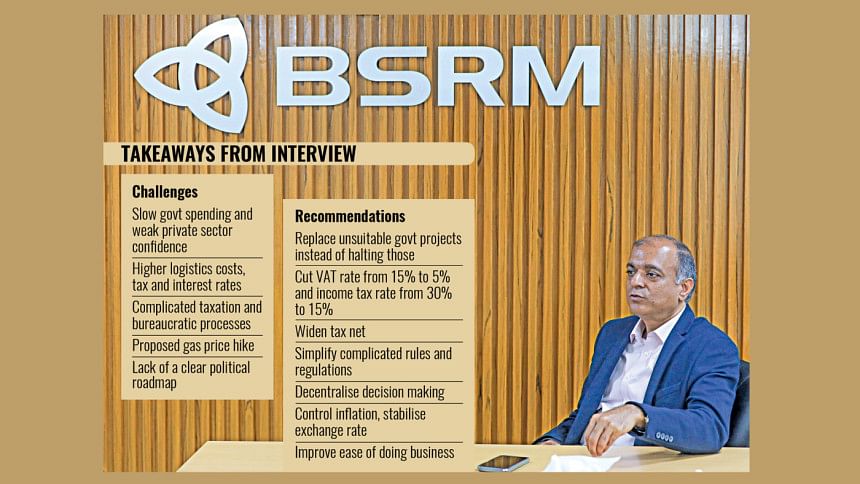Steelmakers struggle against growing headwinds

Local steel industry is enduring a turbulent phase, grappling with subdued demand due to sluggish government spending and wavering private sector confidence, driven largely by political uncertainty.
Adding to the strain, the sector – already weighed down by high operating costs and regulatory inefficiencies – now faces an additional blow with the proposed gas price hike, according to Aameir Alihussain, managing director of BSRM, the country's leading steel manufacturer based in Chattogram.
In an interview with The Daily Star, Alihussain advocated for increased development spending by the government and a clear political direction to restore confidence among private investors.
BSRM recently completed a major expansion project, setting up its third re-rolling plant in Mirsharai. This raised its combined annual production capacity of rods and billets to 24 lakh tonnes.
Similarly, by adding a second unit, Chattogram-based Abul Khair Steel expanded its annual long steel production capacity to 30 lakh tonnes.
Alihussain said industry people took these expansion decisions three to four years ago based on certain momentum of the economy. "But that momentum has suddenly gone down."
"Since the political changeover in August last year, the steel market has seen very slow demand, a trend that persisted through November," he said.
Though there was a modest uptick in December and January, the steelmaker said that the sales spike was merely due to "pent-up demand" – a temporary rebound after months of stagnation.
"The dry season is usually the peak period for construction, but we are not seeing that usual activity," he added.
For the sales slowdown, he pointed the finger at reduced public expenditure.
Government projects account for 60–70 percent of total steel demand, and any contraction in this area hits the sector directly, said the BSRM MD.
"There are a few major projects underway in Dhaka, such as metro rail constructions and the elevated expressway, but there is a stalemate in mid and lower-tier construction, especially in upazilas and unions," he said.
He said that the interim government may face limitations in new development projects, but previously approved ones should continue. "If a project is found unsuitable, the government should replace it with a better one instead of halting development altogether."
Alihussain recognised the government's attempts to blunt the stubbornly high inflationary curve through spending cuts, but argued that economic momentum must be maintained in parallel.
"To sustain the economy, we have to keep up spending, while also managing inflation and macroeconomic risks," he said.
The BSRM chief called for a complete overhaul of the taxation system to both widen the tax net and reduce rates.
"Our VAT rate has been increased to 15 percent, and income tax to 30 percent. These should be lowered to 5 percent and 15 percent, respectively," he said. "This will initially reduce government revenue, but within two years, as the tax base expands, revenue will shoot up."
Expressing concern over the proposed gas price hike, Alihussain said it would deal a fresh blow to the steel industry.
"If gas prices suddenly jump, product prices will rise. That would hit demand because many customers simply won't be able to afford the increase," he said, suggesting subsidies as an alternative.
He pointed to ongoing political uncertainty as a major deterrent to private investment.
"Before making decisions, investors are waiting to see a clear political roadmap," he said.
While appreciating the interim government's initiatives toward political reform, he expressed disappointment over red tapes and other bureaucratic hurdles in doing business.
"Businesses are still stuck with the same old problems – waiting endlessly for approvals, chasing files, dealing with centralised decision-making in Dhaka. If you send a letter to a government office, you rarely get a response unless you follow up in person."
"From an individual citizen's perspective or a business one – we haven't seen any real change," he said, urging policymakers to take bold and transformative steps.
"If we keep going as we are, nothing will change. We need strong leadership to reform taxation, improve ease of doing business and control macroeconomic risks. Otherwise, FDI will remain a distant dream."
On an optimistic note, he commended the Bangladesh Bank for its role in stabilising the exchange rate.
"Macroeconomic stability is important. As GDP grows, consumption and imports will rise. But if exports don't grow at the same pace, we'll be stuck," he said, calling for export diversification and a more competitive business environment.
"If tax and interest rates are reduced, energy and logistics costs lowered, and policies simplified – we can attract foreign investment and grow exports," he added.
As for BSRM's own strategy in this uncertain period, Alihussain said the company would prioritise financial stability and cost control over fresh investments.
"Our strategy is to keep our costs and loans in check. Interest rates are too high to justify new investments in existing plants. Instead, we will maintain our cash flow and sustain the business," he commented.

 For all latest news, follow The Daily Star's Google News channel.
For all latest news, follow The Daily Star's Google News channel. 



Comments